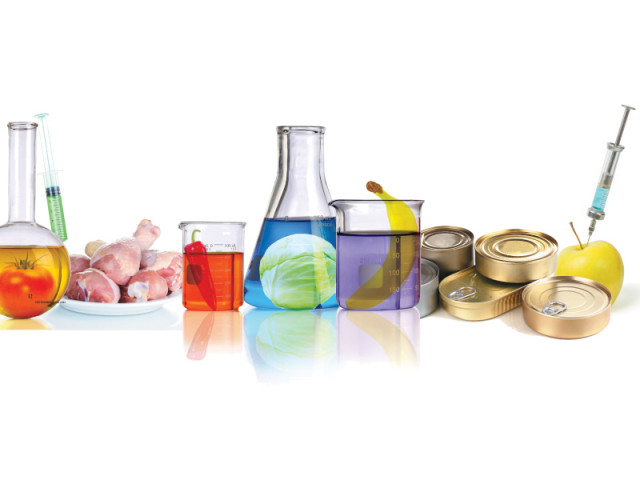Shopping for green: Chemically crazy
You may opt for paper bags rather than plastic when you go shopping, but how safe are the groceries you put in them?.

Welcome to the age of mass consumption — an inescapable facet of ‘modern’ life.
It’s become almost impossible to save yourself from toxins that are present in the air we breathe, the water we drink and the food we eat. For those who want to stay healthy — and hence consume only fresh and organic foods and keep away from tinned or processed edible products — life in a world gone chemically crazy is no easy feat. Unfortunately, food that was once reasonably chemical free can no more be found with nature’s untainted goodness.
Meat, poultry and dairy products are prime examples of the chemical hazards we face in our everyday lives. Even when purchased fresh, you can expect these to be contaminated with pesticides, antibiotics, growth hormones, toxins, fertilisers, fungicides and heavy metals. These nasties have either been directly administered to the livestock for increased productivity and weight or have unwittingly been taken in by the animals through food and water. And no, they cannot be washed off or destroyed even in the cooking process.
Opting to use tinned or processed meat and poultry products is even worse. These may contain an astonishing variety of additives, preservatives, flavour enhancers and food colour and may have residual chemicals, such as ‘peeling’ aids and defoaming agents, which have been retained inadvertently during commercial cooking. Additional contamination from lubricants, paints and packaging (tinning, plastic packing or otherwise), can occur if the factory premises and equipment are not scrupulously maintained for hygiene. Such is the case even for foreign products, which are popularly deemed safe and hygienic to consume.
The only way to ensure that foodstuffs are completely free from additives and contamination of any kind is, obviously, to produce them yourself. But very few people around the world are able to do this. Even those marketing their products as ‘organic’ are not always completely truthful in their claim and in Pakistan, specifically, there are a mere handful of farmers and producers who are genuinely organic-certified.
Fruits and vegetables, unless homegrown under strict organic conditions, are just as lethal — sometimes even more than meat and poultry — as they are subjected to an incredible amount and array of toxins. Crops and vegetation may be irrigated with toxic water or sprayed with pesticides. Cauliflowers and many fruits are dipped in strong chemical solutions to keep insects away in and on their way to the market. Over the years, these poisons have built up in the soil to a point where it has become dead, and thus it necessitates the use of excessive chemical fertilisers for anything to be grown there at all. What’s worse is that washing fruits and vegetables after getting them home does not remove the deeply embedded toxins no matter how thoroughly these are scrubbed clean.
Seafood products of all kinds, and irrespective of origin, are rarely toxin-free. One only has to think of the disgusting state of the world’s oceans to understand why seafood should not be consumed frequently.
Under such conditions, there are a few precautionary measures you can take to protect yourself and your family’s health.
First, anything that does not smell right should be avoided at all costs. This may sound obvious, but it is amazing how many shoppers purchase foodstuff based on looks alone and may never notice, for example, that a fruit is exuding a purely chemical aroma. Thus, using your nose rather than your eyes when it comes down to identifying ‘safe’ foods is a tip to note.
The fact that an increasing number of outlets, especially up-market ones, now package fruit, vegetables, meat and poultry on polystyrene trays sealed in plastic wrap — both of which should be avoided for health and environmental reasons — does not help. Frozen foods should be totally avoided in times of power outages, as goodness knows how many times the items have thawed and been refrozen. With processed foods, take time to read the labels: if the product is not correctly labeled, don’t buy it. At the very least, avoid processed foods containing the most dangerous E numbers of all: E129, E123, E951, E210, E151, E320, E213 and E226.
E129 is the food colouring Allura Red AC, which is used in a wide variety of sauces, snacks, soups and other processed foods, and can result in severe allergic reactions. E123 is Amaranth, a food colouring banned in the US for being a potential allergen. E951 is potentially lethal Aspartame, a sweetener with dangerous side effects for many people. E210 is Benzoic acid which, yet again, can cause allergic reactions. E151 is Brilliant Black BN which is used in many drinks, sauces and snacks, and which must be avoided by anyone prone to allergies. E320 is Butylated Hydroxy-anisole (BHA), a preservative identified by the International Agency for Research on Cancer as a carcinogen. E213 is Calcium Benzoate, which is yet another allergenic preservative. And E226 is Calcium Sulphite, a preservative banned in the US but used elsewhere in just about everything, which the International Labour Organisation says has an adverse affect on one’s blood pressure and the bronchial system.
These are just a few examples but enough to underline the need for caution, if not outright avoidance, when buying tinned, frozen or processed foods and drinks. The ideal thing to do would be to cook, bake and grow at home. But with so many women working professionally and not having the time for increased domestic chores, it is an increasingly difficult prospect. It is best, therefore, to be more discrete in what you eat and drink from the market.
Published in The Express Tribune, Sunday Magazine, September 16th, 2012.
Like Express Tribune Magazine on Facebook and follow at @ETribuneMag



















COMMENTS
Comments are moderated and generally will be posted if they are on-topic and not abusive.
For more information, please see our Comments FAQ